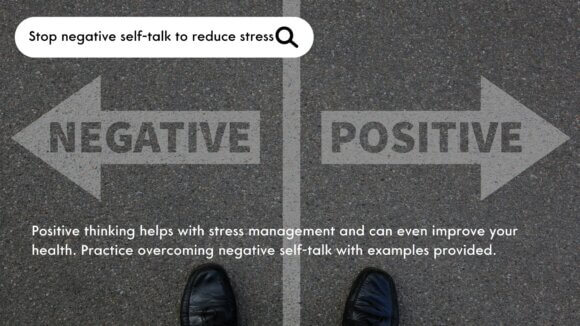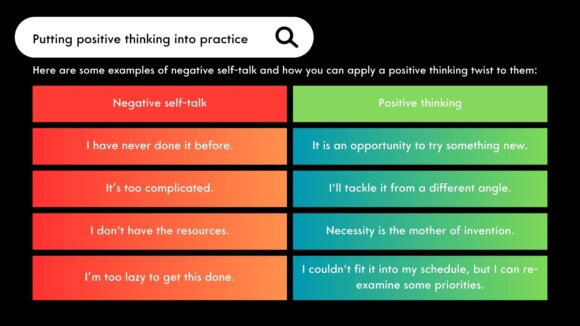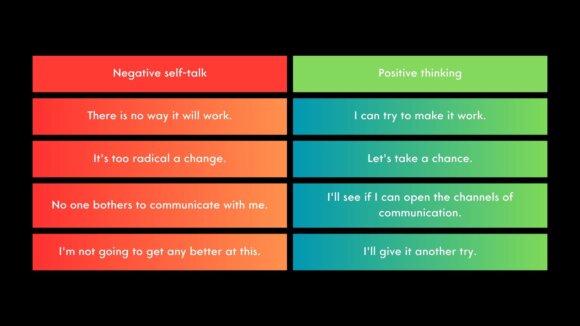By Krista Harris
| 5 May 2023
4 Minute Read
By Rich Read
Instinct trainer, Rich, takes us through his extensive research into positive thinking and reducing stress…
Is Your Glass Half-empty or Half-full?
How you answer this question may reflect your outlook on life, and affect your health.
Studies show that personality traits such as optimism and pessimism can affect many areas of your health and well-being. The positive thinking that usually comes with optimism is a key part of effective stress management. And effective stress management is associated with many health benefits.
Positive Thinking and Self-talk
Positive thinking doesn’t mean ignoring life’s unpleasant situations. Rather it means that you approach unpleasantness in a positive, productive way. You think the best is going to happen, not the worst.
Positive thinking often starts with self-talk. These automatic thoughts can be positive or negative. Some of your self-talk comes from logic and reason. Other self-talk arises from misconceptions created because of a lack of information or expectations due to preconceived ideas of what may happen.
If the thoughts that run through your head are mostly negative, your outlook on life is more likely pessimistic. If your thoughts are mostly positive, you’re likely an optimist, someone who practises positive thinking.

The Health Benefits of Positive Thinking
- Increased life span
- Lower rates of depression, anxiety and better psychological and physical well being
- Lower levels of distress and pain and a greater resistance to illnesses
- Better cardiovascular health and reduced risk of death from cardiovascular disease, respiratory conditions, strokes, cancer and, infection
Having a positive outlook enables you to cope better with stressful situations, which reduces the harmful health effects of stress on your body.
It’s also thought that positive and optimistic people tend to live healthier lifestyles — they get more physical activity, follow a healthier diet, and don’t smoke or drink alcohol in excess.
Identifying Negative Thinking
- Filtering. You focus on the negative aspects of a situation and filter out all the positive ones.
- Personalising. When something bad occurs, you automatically blame yourself.
- Catastrophising. You automatically anticipate the worst without facts that the worse will happen.
- Blaming Others. You try to say someone else is responsible for what happened to you instead of yourself. You avoid being responsible for your thoughts and feelings.
- Magnifying. Making a big deal out of minor problems.
- Perfectionism. Keeping impossible standards and trying to be more perfect sets yourself up for failure.
- Polarising. You see things only as either good or bad. There is no middle ground.

Focusing on Positive Thinking
You can learn to turn negative thinking into positive thinking. The process is simple, but it does take time and practice — you’re creating a new habit, after all:
- Identify areas of your life that you usually think negatively about, whether it’s work, your daily commute, life changes or a relationship. Think of a positive thought to manage your stress instead of a negative one.
- Check. Periodically during the day, stop and evaluate what you’re thinking. If you find that your thoughts are mainly negative, try to find a way to put a positive spin on them.
- Be open to humour. Give yourself permission to smile or laugh, especially during difficult times. Seek humour in everyday happenings.
- Healthy lifestyle. Exercise positively affects mood and reduces stress. Follow a healthy diet to fuel your mind and body. Get enough sleep. And learn techniques to manage stress.
- Surround yourself with positive people. Make sure those in your life are positive, supportive people you can depend on to give helpful advice and feedback.
- Practice positive self-talk. Start by following one simple rule: Don’t say anything to yourself that you wouldn’t say to anyone else. Be gentle and encouraging with yourself. If a negative thought enters your mind, evaluate it rationally and respond with affirmations of what is good about you. Think about things you’re thankful for in your life.
Putting Positive Thinking Into Practice


Practicing Positive Thinking Everyday
If you tend to have a negative outlook, don’t expect to become an optimist overnight. But with practice, eventually your self-talk will contain less self-criticism and more self-acceptance. You may also become less critical of the world around you.
When your state of mind is generally optimistic, you’re better able to handle everyday stress in a more constructive way. That ability may contribute to the widely observed health benefits of positive thinking.
Remember
- Positive thinking helps with stress management and can even improve your health.
- How we deal with a situation has a dramatic effect on our mental and physical health.
- Positive thinking starts with adopting a positive self-talk strategy.
- There is a clear link between adopting positive thinking practises and a reduction in many health issues such as depression or cardiovascular disease.
- Focus on positive thinking: Identify areas to change, check yourself, be open to humour, follow a healthy lifestyle, surround yourself with positive people, and practice!
- It takes time to embed a new habit, follow the process and be kind when you are struggling to implement it, consistency is key.





